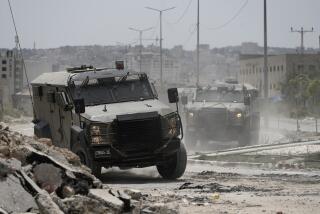Al Qaeda in Iraq blamed for ambush
- Share via
baghdad -- Al Qaeda-allied militants holed up in a volatile southeastern Baghdad neighborhood were believed responsible for an ambush that killed five U.S. soldiers scouring the capital for bomb-building sites, a spokesman for American-led forces said Sunday.
After a sniper’s bullet felled a soldier Saturday in the Arab Jabour district, his fellow troops from Task Force Marne rushed the house from which the shot was fired, said the spokesman, Janah Hammoud. As they did, an explosion from a pressure-activated blast killed four more soldiers and injured four others.
Since the Pentagon stepped up its offensive against Al Qaeda in Iraq and other militant groups with the addition of 28,500 troops this year, casualties have mounted, as has the complexity of attacks on U.S. patrols.
The latest deaths bring to at least 3,689 the number of American troops killed since the U.S.-led invasion in March 2003, according to the website icasualties.org.
Task Force Marne, which has lost at least 70 soldiers in four months, has been targeting insurgent bomb-making sites and safe houses in the capital’s violence-racked southern underbelly. The area also is the scene of much of the sectarian killings in the city.
Coalition forces Sunday also raided suspected Al Qaeda in Iraq hide-outs in west Baghdad, Samarra, Mosul and Tikrit, arresting 30 suspected militants, including two accused of trafficking weapons for the group, the U.S. military reported.
“Our operations continue to target those who associate with and work for Al Qaeda in Iraq’s leaders,” military spokesman Lt. Col. Christopher Garver said. “The pressure is on, and we are keeping them on the run.”
Meanwhile, beleaguered Prime Minister Nouri Maliki called on his government’s fractious religious and ethnic factions to meet in the next few days to renew reconciliation efforts.
“I have extended an invitation to the main political leadership to meet and discuss essential issues in the political process,” Maliki told Iraqi television, pledging that his Shiite Muslim-led government would find compromise with Sunni, Kurdish and other factions if their power-sharing concerns were legitimate and constitutional.
It remained uncertain, however, whether Sunni Arab leaders would heed the call for negotiations. The leader of the largest Sunni political bloc in the Iraqi parliament appealed Sunday to neighboring Arab countries for help in defeating what he called Iranian-supported Shiite violence against Iraqi Sunnis.
Baghdad is at risk of falling to “Persians” and “Safawis” -- Sunni terms for Iranian Shiites -- said Adnan Dulaimi of the Iraqi Accordance Front, or Tawafiq. He accused Iranian-backed death squads of trying to drive Sunnis from the capital.
Seventeen of Maliki’s 37 Cabinet ministers, including all six Tawafiq members, have abandoned the government in recent weeks, many claiming that the Shiite prime minister has turned a blind eye to torture, assassinations and execution-style slayings by Shiite militants. Much of the violence has been blamed on Shiite cleric Muqtada Sadr’s Al Mahdi militia operating from the impoverished Sadr City area of the capital.
President Bush ordered the increase in troop levels early this year, bringing the U.S. deployment to more than 160,000, in an attempt to quell both insurgents and sectarian extremists so Maliki could shore up his fragile governing coalition. The political alliance has shown continued signs of unraveling, though, heightening concerns about Iraq’s future and the effectiveness of the U.S. troop buildup.
Mortar shells landed in north Baghdad on Sunday night, killing four Iraqis. An Iraqi soldier on leave was gunned down outside his home in Babil province, and 17 bullet-riddled bodies were found around Baghdad, officials said.
--
--
Times staff writers Saif Hameed and Raheem Salman contributed to this report.
More to Read
Sign up for Essential California
The most important California stories and recommendations in your inbox every morning.
You may occasionally receive promotional content from the Los Angeles Times.













